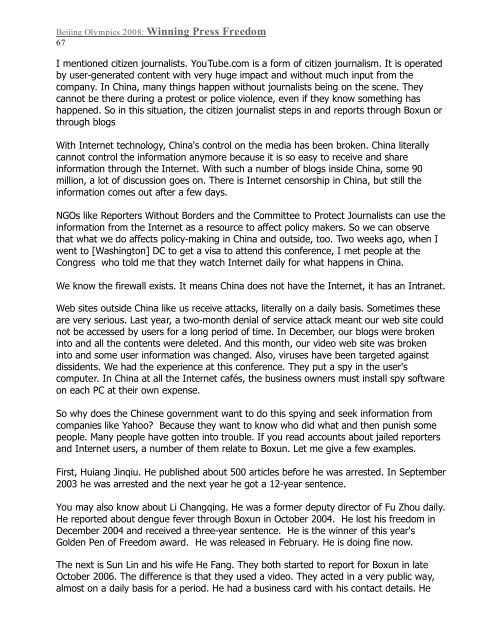Beijing Olympics 2008: Winning Press Freedom - World Press ...
Beijing Olympics 2008: Winning Press Freedom - World Press ...
Beijing Olympics 2008: Winning Press Freedom - World Press ...
Create successful ePaper yourself
Turn your PDF publications into a flip-book with our unique Google optimized e-Paper software.
<strong>Beijing</strong> <strong>Olympics</strong> <strong>2008</strong>: <strong>Winning</strong> <strong>Press</strong> <strong>Freedom</strong><br />
67<br />
I mentioned citizen journalists. YouTube.com is a form of citizen journalism. It is operated<br />
by user-generated content with very huge impact and without much input from the<br />
company. In China, many things happen without journalists being on the scene. They<br />
cannot be there during a protest or police violence, even if they know something has<br />
happened. So in this situation, the citizen journalist steps in and reports through Boxun or<br />
through blogs<br />
With Internet technology, China's control on the media has been broken. China literally<br />
cannot control the information anymore because it is so easy to receive and share<br />
information through the Internet. With such a number of blogs inside China, some 90<br />
million, a lot of discussion goes on. There is Internet censorship in China, but still the<br />
information comes out after a few days.<br />
NGOs like Reporters Without Borders and the Committee to Protect Journalists can use the<br />
information from the Internet as a resource to affect policy makers. So we can observe<br />
that what we do affects policy-making in China and outside, too. Two weeks ago, when I<br />
went to [Washington] DC to get a visa to attend this conference, I met people at the<br />
Congress who told me that they watch Internet daily for what happens in China.<br />
We know the firewall exists. It means China does not have the Internet, it has an Intranet.<br />
Web sites outside China like us receive attacks, literally on a daily basis. Sometimes these<br />
are very serious. Last year, a two-month denial of service attack meant our web site could<br />
not be accessed by users for a long period of time. In December, our blogs were broken<br />
into and all the contents were deleted. And this month, our video web site was broken<br />
into and some user information was changed. Also, viruses have been targeted against<br />
dissidents. We had the experience at this conference. They put a spy in the user's<br />
computer. In China at all the Internet cafés, the business owners must install spy software<br />
on each PC at their own expense.<br />
So why does the Chinese government want to do this spying and seek information from<br />
companies like Yahoo? Because they want to know who did what and then punish some<br />
people. Many people have gotten into trouble. If you read accounts about jailed reporters<br />
and Internet users, a number of them relate to Boxun. Let me give a few examples.<br />
First, Huiang Jinqiu. He published about 500 articles before he was arrested. In September<br />
2003 he was arrested and the next year he got a 12-year sentence.<br />
You may also know about Li Changqing. He was a former deputy director of Fu Zhou daily.<br />
He reported about dengue fever through Boxun in October 2004. He lost his freedom in<br />
December 2004 and received a three-year sentence. He is the winner of this year's<br />
Golden Pen of <strong>Freedom</strong> award. He was released in February. He is doing fine now.<br />
The next is Sun Lin and his wife He Fang. They both started to report for Boxun in late<br />
October 2006. The difference is that they used a video. They acted in a very public way,<br />
almost on a daily basis for a period. He had a business card with his contact details. He





